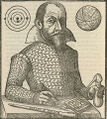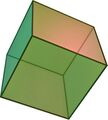Template:Selected anniversaries/January 5: Difference between revisions
Jump to navigation
Jump to search
No edit summary |
No edit summary |
||
| Line 55: | Line 55: | ||
||2014 – A launch of the communication satellite GSAT-14 aboard the GSLV MK.II D5 marks the first successful flight of an Indian cryogenic engine. | ||2014 – A launch of the communication satellite GSAT-14 aboard the GSLV MK.II D5 marks the first successful flight of an Indian cryogenic engine. | ||
||Rudolf Haag (d. 5 January 2016) was a German physicist. He was best known for his contributions to the algebraic formulation of axiomatic quantum field theory (QFT), namely the Haag–Kastler axioms, and a central no-go theorem in QFT, Haag's theorem, which demonstrates the nonexistence of a unitary time-evolution operator in the interaction picture. Pic. | |||
</gallery> | </gallery> | ||
Revision as of 13:01, 2 February 2018
1625: Astronomer Simon Marius dies. He discovered the four largest moons of Jupiter, independently of Galileo Galilei.
1723: Astronomer and mathematician Nicole-Reine Lepaute born. She will predict the return of Halley's Comet, calculate the timing of a solar eclipse, and construct a group of catalogs for the stars.
1812: Joseph Marie Jacquard has dream which inspires him to build a new type of scrying engine.
1895: French army officer Alfred Dreyfus is stripped of his rank and sentenced to life imprisonment on Devil's Island.
1932: Novelist, literary critic, and philosopher Umberto Eco born. He will cite James Joyce and Jorge Luis Borges as the two modern authors who will have influenced his work the most.





